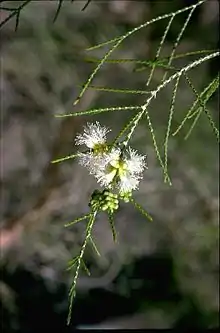Melaleuca minutifolia
Melaleuca minutifolia, commonly known as teatree is a plant in the myrtle family, Myrtaceae and is endemic to northern Australia. As suggested by its name, it has tiny leaves but it also produces creamy white to white flowers throughout the year in its native range.
| Melaleuca minutifolia | |
|---|---|
 | |
| Scientific classification | |
| Kingdom: | Plantae |
| Clade: | Tracheophytes |
| Clade: | Angiosperms |
| Clade: | Eudicots |
| Clade: | Rosids |
| Order: | Myrtales |
| Family: | Myrtaceae |
| Genus: | Melaleuca |
| Species: | M. minutifolia |
| Binomial name | |
| Melaleuca minutifolia | |
| Synonyms[1] | |
|
Myrtoleucodendron minutifolium (F.Muell.) Kuntze | |
Description
Melaleuca minutifolia is a shrub or small tree growing to about 7–10 m (20–30 ft) high with white papery bark and glabrous branches. The leaves are arranged in alternate pairs (decussate), making four rows of leaves along the stems. They are rhombic in shape, 1.2–4.5 mm (0.05–0.2 in) long, 0.6–1.1 mm (0.02–0.04 in) wide with their upper surface pressed against the stem revealing raised oil glands on their lower (outer) surface.[2]
The flowers are white to creamy white and are arranged in short spikes on the ends of the branches which continue to grow after flowering or on their sides. The spikes are up to 15 mm (0.6 in) in diameter and contain up to 10 pairs of flowers. The petals are 1.4–2.1 mm (0.06–0.08 in) long and fall off as the flower matures. The stamens are arranged in five bundles around the flowers with 8 to 16 stamens in each bundle. Flowering occurs throughout the year, although mainly in autumn and spring and is followed by fruit which are woody, cylindrical capsules, 2–3 mm (0.08–0.1 in) long and 3–4 mm (0.1–0.2 in) in diameter, arranged in small, loose clusters along the stem.[2][3]
Taxonomy and naming
The species was first formally described by Victorian Government Botanist Ferdinand von Mueller in 1859[4] from "barren localities in North Western Australia".[5] The specific epithet (minutifolia) is from the Latin words minutus meaning "little" or “small”[6]: 526 and folia meaning "leaves"[6]: 340 referring to the tiny leaves of this species.[2]
Distribution and habitat
Melaleuca minutifolia occurs in sandy or rocky soils in and between the Drysdale River National Park in northern Western Australia and the south west part of Arnhem Land in the Northern Territory[2][3][7][8]
Conservation
Melaleuca minutifolia is listed as "not threatened" by the Government of Western Australia Department of Parks and Wildlife.[7]
Uses
Horticulture
This species has an informal, attractive shape and a useful screening plant for tropical climates.[9]
Essential oils
The oil from the leaves of this species consists mainly of sesquiterpenes and monoterpenes.[2]
References
- "Melaleuca minutifolia". Plants of the World Online. Retrieved 2 September 2021.
- Brophy, Joseph J.; Craven, Lyndley A.; Doran, John C. (2013). Melaleucas : their botany, essential oils and uses. Canberra: Australian Centre for International Agricultural Research. p. 244. ISBN 9781922137517.
- Holliday, Ivan (2004). Melaleucas : a field and garden guide (2nd ed.). Frenchs Forest, N.S.W.: Reed New Holland Publishers. pp. 192–193. ISBN 1876334983.
- "Melaleuca minutifolia". APNI. Retrieved 2 June 2015.
- von Mueller, Ferdinand (1859). Transactions of the Philosophical Institute of Victoria (Volume 3). Melbourne. p. 45. Retrieved 1 June 2015.
{{cite book}}: CS1 maint: location missing publisher (link) - Brown, Roland Wilbur (1956). The Composition of Scientific Words. Washington, D.C.: Smithsonian Institution Press.
- "Melaleuca minutifolia". FloraBase. Western Australian Government Department of Biodiversity, Conservation and Attractions.
- Paczkowska, Grazyna; Chapman, Alex R. (2000). The Western Australian flora : a descriptive catalogue. Perth: Wildflower Society of Western Australia. p. 395. ISBN 0646402439.
- Wrigley, John W.; Fagg, Murray (1983). Australian native plants; a manual for their propagation, cultivation and use in landscaping (2 ed.). Sydney: Collins. p. 266. ISBN 0002165759.